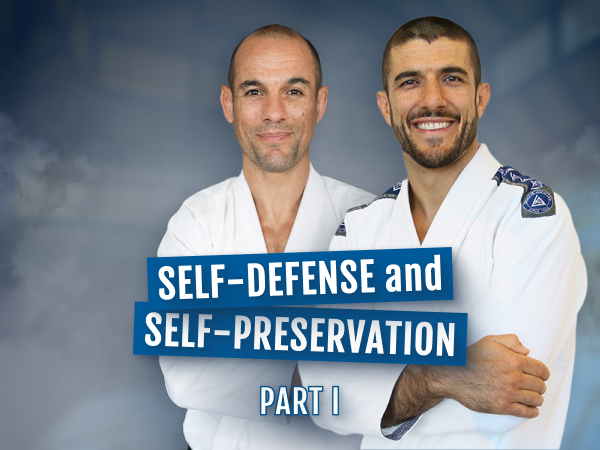Self-Defense and Self-Preservation – Part I
When you think of self-defense, what typically comes to mind? Is it defending yourself from an attacker on the street? Is it a home invader? Or is it less about a specific scenario and simply a desire to feel comfortable with your own abilities?
No matter how you think of self-defense, chances are you tend to perceive it as a means of protecting yourself from the attack of another person. However, as Rener and Ryron Gracie—along with their guest Master Pedro Sauer—note in the below video, self-defense is not just about being able to fight off an assailant. As we explore in the first part of this two-part blog, self-defense is also a matter of self-preservation.
What Is Self-Defense?
We say the phrase “self-defense” so often that we tend to glaze over the full meaning of those two words when uttered in combination. Defending yourself is as much about learning the techniques of martial arts like jiu-jitsu as it is about preventing injury. Seen in this light, self-defense goes hand in hand with safe and sustainable training practices.
As Rener says, a lot of people come to jiu-jitsu under the belief that they have to push themselves to the extreme and fight as though their life depends upon it even when they’re rolling with partners from class. While this may be sustainable for people who are in their teens and early twenties, and while there are exceptional people who can go hard for decades, consistently training at this level is a recipe for burnout for most of us and, more importantly, an open invitation to injuries. Your joints simply cannot stand that kind of constant wear and tear.
This is self-defeating for several reasons. First of all, getting frequently injured makes you less capable of warding off an attacker and, therefore, less able to defend yourself. Secondly, frequent injuries will mean you spend less time training and more time recuperating, ultimately making you a less experienced fighter when compared to others who started at the same time as you but took things slower and avoided injury. Finally, if you constantly get injured, it will only be a matter of time before you can no longer train jiu-jitsu without fear of reinjury, which means you may never reach your full potential as a fighter.
It takes the average person around a decade to become a black belt. If you push your body to the breaking point day in and day out, you may end up permanently sidelined after only three or four years. That is simply not enough time to reach the level of black belt. Meanwhile, those who focused on self-preservation will be able to obtain their black belts and to continue training into their sixties, seventies, or even eighties.
How to Put Self-Preservation First
As Rener says, a culture of jiu-jitsu has developed where a lot of instructors and coaches appreciate high levels of intensity while their students are training. They applaud flashy sweeps and brutal submission holds. As a result, students end up using these moves and trying to ingratiate themselves to their instructors. While that sense of approval can mean a lot at the moment, it’s not something that you should be looking for day in and day out. Instead, you should always keep in mind that the most important aspect of self-defense is the ability to preserve yourself. You want to be able to enjoy the art of jiu-jitsu for a lifetime. “The more boring your jiu-jitsu looks,” Ryron says, “the more impressive it is in my scale.”
As Master Pedro explains, self-preservation in jiu-jitsu begins with ego control and having a good relationship with your partner. You want to be able to push your partner to their breaking point and to have your partner push you, but you have to remember that you are only training. It’s not just okay, but healthy to tap when someone has you beat early on. After you tap, you can then ask them to take it from the same spot, but to go easier so that you can try to escape.
By admitting that your partner got the best of you, you can remove ego from the equation and focus instead of improving your technique and your strategy. When you fail to control your ego, this is when you start pushing yourself to go harder, which in turn will make your partner increase their intensity. True, achieving victory against an opponent is a great feeling, especially in a tournament setting, but constantly training at full throttle is not sustainable.
As we’ll explore in the next post, when your focus and the focus of your partner becomes self-improvement rather than dominating your partner, you begin to use less agility and strength and more technique and strategy. While it may not make you a flashier fighter, it will ultimately make you a more proficient martial artist.

